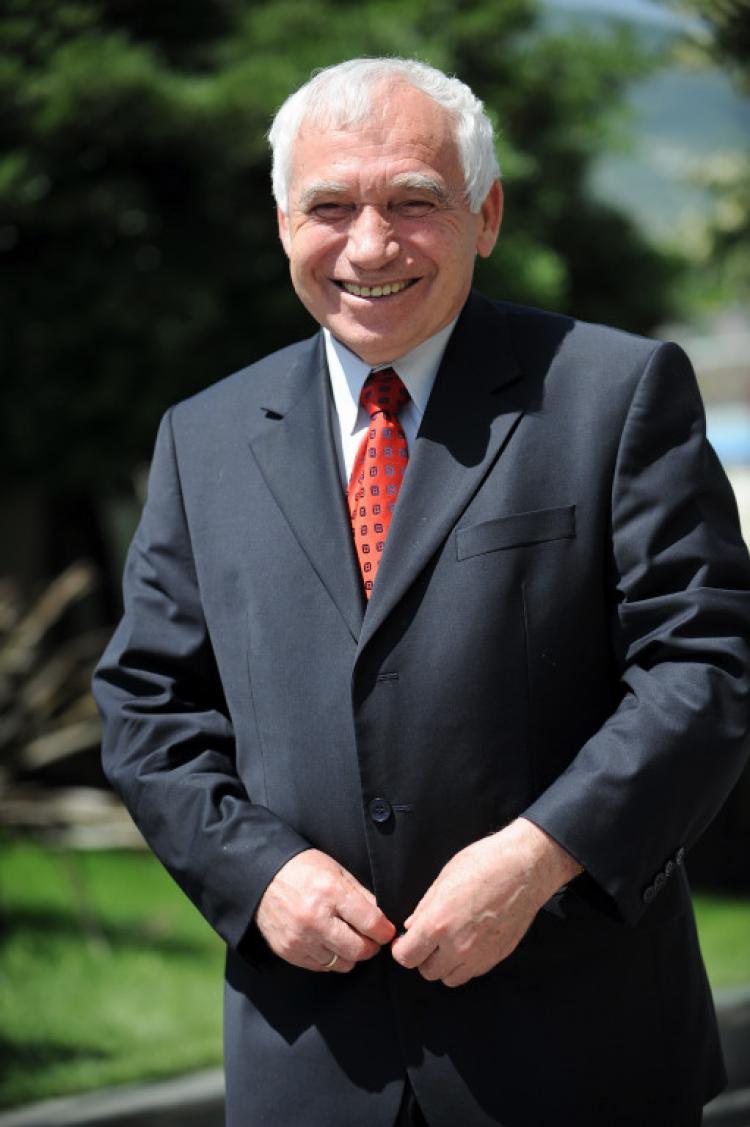The Berlin Wall, a symbol of division between Eastern and Western Europe for three decades, fell on Nov. 9, 1989.The winds of change in Eastern Europe shook the foundations of the wall. Images of Germans, relieved as they stood on the finally crumbling structure, capture the era. The wall’s collapse rippled back across Eastern Europe, and largely peaceful revolutions ended communist rule in one country after another. The Soviet Union fell just over two years later. Two decades on, we revisit the wall’s collapse and shed light on its significance.
SOFIA, Bulgaria—Zhelyu Zhelev, 74, was Bulgaria’s first democratically elected president, from 1992 to 1997. He was one of the initiators of the democracy movement in the country that preceded the collapse of communism. Communism was a doomed system, Zhelev says.
“For nearly 50 years in Bulgaria it couldn’t give people basic values. It couldn’t give them more freedom, higher living standards, or real prospects like the Western world did. Communism was impossible due to its political, economic and moral inconsistency.”
The democracy movement started to grow in early 1988 with the establishment of civil society groups, Zhelev said.
“Gradually they involved thousands of intellectuals. Communist leaders got very scared and realized the situation was getting out of control. In order to save themselves, they launched an internal coup d’état against then top leader Todor Zhivkov on Nov. 9, declaring themselves ‘pioneers of the democratic process.’”
But the communists fooled no one, Zhelev said. “A month later, on Dec. 14 at a rally in front of the Parliament, nobody from the Bulgarian communist party leaders dared to come out to meet the ferocious crowd. Students shouted: ‘Hangmen! Murderers! Go away!’”
At the time, Zhelev was trying to keep a low profile since he had already been marked as a dissident for 20 years.
“My home was tapped and I was even exiled out of Sofia. Later I took part in establishing the Union of Democratic Forces (UDF), the first officially recognized democratic party in Bulgaria.”
“The Soviet totalitarian model was imposed here with the means of terror and one-party system with violence against any opposition. The party controlled people’s thoughts and public actions. Before communism, Bulgaria was economically the most developed Balkan country, and afterwards was left the poorest. Communism left the country totally exhausted of resources.”
There are still remnants of communism in the country, and in some of the elderly even nostalgia, Zhelev says.
“Some of them live in the illusion that they had safety during Zhivkov’s time. But they could not live, work and
travel freely. And because they didn’t know a different life, they think safety in Bulgaria is lost. I think this mentality will be cleaned when Bulgaria becomes a wealthier state, when it reaches the average standard of the EU.”
SOFIA, Bulgaria—Zhelyu Zhelev, 74, was Bulgaria’s first democratically elected president, from 1992 to 1997. He was one of the initiators of the democracy movement in the country that preceded the collapse of communism. Communism was a doomed system, Zhelev says.
“For nearly 50 years in Bulgaria it couldn’t give people basic values. It couldn’t give them more freedom, higher living standards, or real prospects like the Western world did. Communism was impossible due to its political, economic and moral inconsistency.”
The democracy movement started to grow in early 1988 with the establishment of civil society groups, Zhelev said.
“Gradually they involved thousands of intellectuals. Communist leaders got very scared and realized the situation was getting out of control. In order to save themselves, they launched an internal coup d’état against then top leader Todor Zhivkov on Nov. 9, declaring themselves ‘pioneers of the democratic process.’”
But the communists fooled no one, Zhelev said. “A month later, on Dec. 14 at a rally in front of the Parliament, nobody from the Bulgarian communist party leaders dared to come out to meet the ferocious crowd. Students shouted: ‘Hangmen! Murderers! Go away!’”
At the time, Zhelev was trying to keep a low profile since he had already been marked as a dissident for 20 years.
“My home was tapped and I was even exiled out of Sofia. Later I took part in establishing the Union of Democratic Forces (UDF), the first officially recognized democratic party in Bulgaria.”
“The Soviet totalitarian model was imposed here with the means of terror and one-party system with violence against any opposition. The party controlled people’s thoughts and public actions. Before communism, Bulgaria was economically the most developed Balkan country, and afterwards was left the poorest. Communism left the country totally exhausted of resources.”
There are still remnants of communism in the country, and in some of the elderly even nostalgia, Zhelev says.
“Some of them live in the illusion that they had safety during Zhivkov’s time. But they could not live, work and
travel freely. And because they didn’t know a different life, they think safety in Bulgaria is lost. I think this mentality will be cleaned when Bulgaria becomes a wealthier state, when it reaches the average standard of the EU.”







